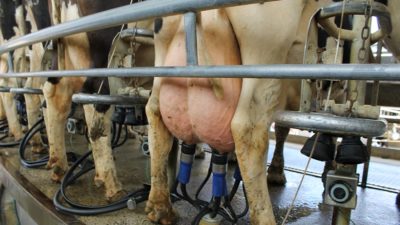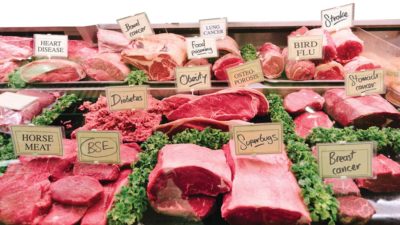Why meat, fish & dairy harm
Plant-based foods protect your health while meat, dairy, and other animal products are harmful – without exception! See the overview below and for more information on specific diseases and how food helps or harms your health, visit our pages below:
| Disease | Harmful effects of meat and dairy |
|---|---|
| Heart Disease and Stroke | Eating lots of meat and dairy foods increases blood pressure and cholesterol and can lead heart disease and stroke. |
| Arthritis | People who eat a lot of red meat have a higher risk of developing inflammatory arthritis. Milk products have also been shown to worsen symptoms in some. |
| Cancer | At least a third of all cancers are caused by poor diet and are therefore preventable. Typical Western diets, rich in animal protein, saturated fat and hormones increase the risk. |
| Breast cancer | Only 5-10% of breast cancers are caused by genes the rest are due to lifestyle factors including diet. Cow’s milk and dairy products are a major source of saturated fat and hormones – both linked to breast cancer. |
| Prostate cancer | Just 10-15% of prostate cancers are caused by genes, the rest are due to lifestyle factors including diet. Saturated fat, calcium and obesity may increase the risk of prostate cancer. The growth hormone IGF-1 is linked to an increased risk of this disease, and milk increases IGF-1. Furthermore, IGF-1 may transform tumours into a more aggressive form of cancer. |
| Bowel cancer | Red and processed meat (such as smoked meat, ham, bacon, sausages, pâté and tinned meat) increase the risk of bowel cancer. This may be due to the type of iron they contain or other compounds found in them. Milk increases IGF-1 levels, which in turn also increases bowel cancer risk. |
| Obesity | Meat and dairy products contain significant amounts of saturated fat and cholesterol. The obesity epidemic is spreading around the globe as ethnic cuisine and traditional food habits are being replaced by Western-style fast foods, soft drinks and increased meat and dairy consumption. As diets high in sugar, fat and animal products replace more traditional diets high in complex carbohydrates and fibre, levels of obesity (and all the associated health problems) rise. |
| Diabetes | The global rise in diabetes is epidemic. Cutting out meat and dairy and so reducing the amount of saturated fat in the diet can significantly reduce your risk of type 2 diabetes. A substantial body of evidence shows that early exposure to proteins founds in cow’s milk (including infant formula) may trigger type 1 diabetes in some children. |
| Disease | Beneficial effects of a vegan diet |
|---|---|
| Heart Disease and Stroke | A low-fat plant-based diet containing plenty of fresh fruit and vegetables, wholegrain foods, pulses (peas, beans and lentils), nuts and seeds can lower cholesterol and even reverse heart disease! |
| Arthritis | A vegan diet can help reduce symptoms – possibly because of the healthier types of fat included and anti-inflammatory chemicals in some vegetables. |
| Cancer | Plant-based diets including a wide range of fruit, vegetables and fibre are associated with reduced cancer risk (and a lower risk of heart disease and diabetes). |
| Breast cancer | Fruit, vegetables, cereals and pulses can lower the risk of breast cancer. Soya foods may protect against it and help those who have the disease. A vegan diet can reduce many of the risk factors associated with breast cancer and may help those who have been diagnosed with it. |
| Prostate cancer | Beans, lentils, peas, tomatoes, raisins, dates and other dried fruit can reduce the risk. Also, lycopene (in tomatoes and other red fruit) and selenium (in Brazil nuts) and soya may lower the risk. High intakes of vegetables and tomatoes are associated with lower levels of IGF-1. Men with prostate cancer who increase their intake of plant-based foods and avoid dairy products and meat may significantly increase their chances of survival. |
| Bowel cancer | A plant-based diet high in fibre and low in saturated fat can help reduce the risk of bowel cancer. Vegans have lower IGF-1 levels (IGF-1 increases the risk of bowel cancer and other cancers). |
| Obesity | A plant-based diet is the healthiest option for weight loss or to maintain a healthy weight. Vegans tend to weigh less than meat- and dairy-eaters and overweight people can shed pounds when they change to a plant-based diet. Replacing saturated animal fats found in meat, dairy and processed foods with fruit, vegetables, nuts and whole grains (containing unsaturated vegetable-oil based fats) can help you lose and maintain a healthy weight. |
| Diabetes | High-fibre foods (wholegrain cereals and pulses such as peas, beans and lentils) can protect against diabetes. A low-fat vegan diet can help improve glycaemic control and plasma lipids more than a conventional diabetes diet. In other words, vegan diets also improve plasma lipid concentrations and have been shown to reverse atherosclerosis progression, thus lowering the risk of heart disease. |
Scroll up










